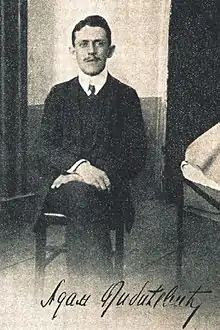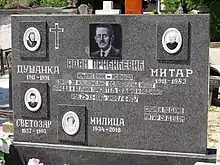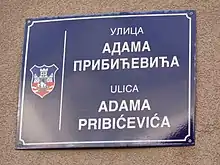Adam Pribićević
Adam Pribićević (Serbian Cyrillic: Адам Прибићевић; 24 December 1880 – 7 February 1957) was a publisher, writer, and politician.
Adam Pribićević | |
|---|---|
 Pribićević in the 1920s | |
| Born | 24 December 1880 |
| Died | 7 February 1957 (aged 76) Windsor, Ontario, Canada |
| Resting place | Batajnica Cemetery, Batajnica |
| Family | Milan, Valerijan and Svetozar (brothers) |
Biography
Pribićević was born in Kostajnica, to a well-known family of Serbs of Croatia.[1] After graduating from gymnasium (high school) in Sremski Karlovci, he studied law at Zagreb. He began his political activities by joining the Srpska Samostalna Stranka (Independent Serbian Party). He published articles in the periodicals Srbobran and Srpsko kolo. A supporter of the social philosophy of Tomáš Garrigue Masaryk, Adam emphasized the role of peasants in the social development of Serbia. Along with a group of Serbian politicians from Croatia, Adam was arrested during a mounting conflict between the Croatian-Serbian Coalition and the Austro-Hungarian authorities. The annexation of Bosnia and Herzegovina in 1908 caused furor among the Serbs of Austria-Hungary. It became a major factor in the high-treason trial of Zagreb in 1909 against the Serb leaders of the Croat-Serb Coalition, which opposed the annexation.[2] Adam and his brother Valerijan Pribićević, a Serbian Orthodox bishop, figured prominently among the defendants. On 9 October 1909, the court in Zagreb passed its sentence: twelve years penal servitude for the brothers and severe terms of imprisonment of between five and eight years for thirty other defendants. Following a subsequent libel suit in Vienna, they were all fully exonerated in a legal sense a year later (1910), and it became apparent that the evidence in the earlier trial had been fabricated with the foreknowledge of the Austro-Hungarian authorities.[2]
After his release, Adam joined the editorial staff of Srpsko kolo. In 1913 on a visit to Belgrade Adam forewarned Nikola Pašić about a compromise between the Croatian-Serbian Coalition in Habsburg Croatia and the Austrian government. When the World War I broke out, Adam was arrested by the Austrians and in 1915 sent to Galicia as an Austrian soldier to fight the Russians. There he used the opportunity to defect to the Russian side. From there he joined the Serbian volunteers fighting within the Serbian army on the Salonika Front.
After the war, Pribićević met up with his brother Svetozar and joined the Democratic Party. He also worked as an editor of the periodical Narod. In 1924 he settled in Kosovo, where he was active in the Independent Democratic Party, founded by his brother Svetozar Pribičević. He also edited the periodical Reč. After the death of his brother Svetozar, Adam was elected to parliament in 1936. In 1938 he became chairman of the Samostalna Demokratska Stranka (Independent Democratic Party).[3]
Between the two world wars, he held many important posts in Yugoslavia. He was a jurist, journalist and political activist who, with his brother Milan, became "the voice of return to the virtues of rural life."
When Nazi Germany occupied the Kingdom of Yugoslavia, Pribićević joined the Chetnik forces of General Dragoljub Mihailović at Ravna Gora fighting both the Nazi and Communist forces. The political and socioeconomic platform for the Ba Congress was drafted by Pribićević. When George Musulin organized the 1944 final rescue of 500 American airmen called Operation Halyard, Mihailović sent a political mission to Bari, Italy aboard an American plane.[4] Pribićević, now former President of the Independent Democratic Party of the Kingdom of Yugoslavia, and his team met with Ivan Šubašić, but were not informed of the Tito-Šubašić Agreement. Pribićević remained in the West after the war ended, like thousands of other soldiers who managed to escape.
His books were banned by the Yugoslav communist government in 1947.[5]
Among the Serbian Canadians, Adam Pribićević was among the most important, eminent, and well-known post-World War II Serbian political émigrés who came from Yugoslavia to Canada.


With two other authors, Dr. Vladimir Belajčić and Dr. Branko Miljuš, Adam Pribićević sent "The Memorandum of Crimes of Genocide Committed against the Serbian People by the Government of the 'Independent State of Croatia' during World War II," addressed to the Fifth General Assembly of the United Nations, 1950.
He committed suicide on 7 February 1957 in Windsor, Ontario.
From 2008, the new 16th street in Busije, a part of Belgrade, carries his name.[6]
Works
- Seljak, 1936
- Naseljavanja Srba po Hrvatskoj i Dalmaciji, 1954
- Od gospodina do seljaka
- Selo kao moralni činilac u životu naroda, 1954
- The Problem of Austro-Hungaria, Voice of Canadian Serbs, 1949
- The Memorandum on Crimes of Genocide Committed against the Serbian People by the Government of the 'Independent State of Croatia' during World War II. Addressed to the Fifth General Assembly of the United Nations, 1950, by Adam Pribićević, Dr. Vladimir Belajčić, and Dr. Branko Miljuš.
References
- Adam Pribićević. "Naseljavanje Srba po Hrvatskoj i Dalmaciji" (PDF) (in Serbian). Retrieved 15 July 2012.
Adam Pribićević Srbin iz Hrvatske – preface by Čedomir Višnjić (p. 5)
- Robert A. Kann (1980). A History of the Habsburg Empire, 1526–1918. University of California Press. p. 448. ISBN 9780520042063.
- Roszkowski, Wojciech; Kofman, Jan (8 July 2016). Biographical Dictionary of Central and Eastern Europe in the Twentieth Century. ISBN 9781317475934.
- (Chalou 1995, p. 198)
- Randelić, Zdenko (2006). Hrvatska u Jugoslaviji 1945. – 1991: od zajedništva do razlaza. Zagreb: Školska knjiga. pp. 156–157. ISBN 953-0-60816-0; 978-953-0-60816-0 Check
|isbn=value: invalid character (help). - ("Službeni list" 02/2008)
Sources
- Ćirković, Sima (2004). The Serbs. Malden: Blackwell Publishing. ISBN 9781405142915.CS1 maint: ref=harv (link)
- Miller, Nicholas J. (1997). Between Nation and State: Serbian Politics in Croatia Before the First World War. Pittsburgh: University of Pittsburgh Press. ISBN 9780822977223.CS1 maint: ref=harv (link)
- Chalou, George C. (December 1995). The Secret War: The Office of Strategic Services in World War II. DIANE Publishing. p. 198. ISBN 978-0-7881-2598-0.CS1 maint: ref=harv (link)
